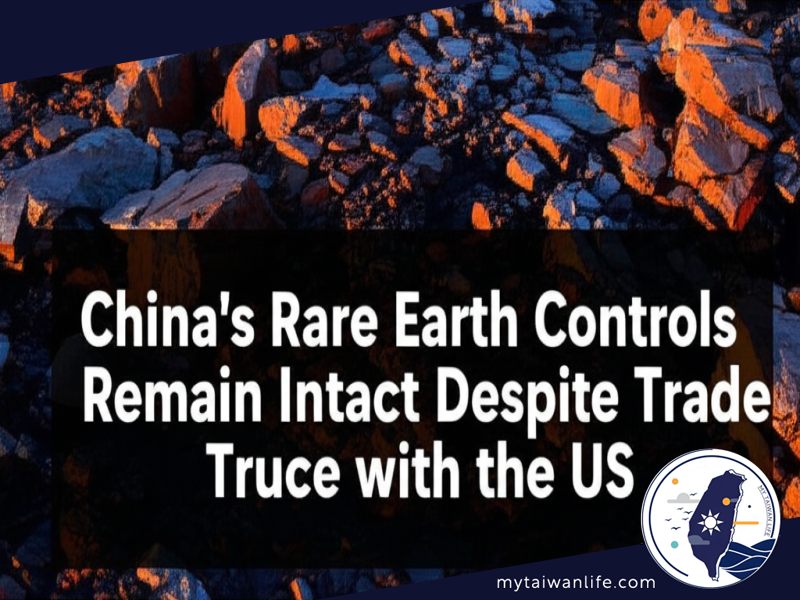China's Rare Earth Controls Remain Intact Despite Trade Truce with the US
Beijing's Tight Grip on Critical Minerals Persists, Preserving Leverage in US Trade Negotiations.

Despite a 90-day truce in the ongoing trade war with the United States, China appears to be maintaining its strict control over rare earth exports. This strategic move preserves a key source of leverage for future negotiations amidst intensifying rivalry with Washington.
As part of the recent trade agreement in Geneva, China pledged to suspend or remove “non-tariff” countermeasures imposed on the US. However, questions have arisen regarding whether this promise extends to China's export controls on seven rare earth minerals and related products, which were implemented in April as a response to US tariffs. These elements are crucial in various applications, from iPhones and electric vehicles to advanced weaponry like the F-35 fighter jets and missile systems. The supply of these minerals is largely dominated by China.
US trade representative Jamieson Greer expressed optimism after the Geneva talks, suggesting China would lift these export restrictions. However, industry experts and insiders suggest otherwise, indicating a strengthening of the existing control regime. This system, introduced in April, requires government approval for each shipment, causing potential delays for businesses. Jon Hykawy, president of Stormcrow Capital, believes the controls are intended to ensure China has enough materials for its domestic priorities.
Gracelin Baskaran, director of the Critical Minerals Security Program at the Center for Strategic and International Studies (CSIS), believes China’s export licensing regime is "here to stay" and could be utilized for a long time. She says this allows Beijing to maintain its leverage in trade talks with the US. Following the Geneva talks, while China's Commerce Ministry removed 28 US firms from its dual-use export control list, there was no mention of changes to rare earth export controls. Chinese authorities have launched a crackdown on smuggling of critical minerals, including rare earth elements, and have convened meetings to “prevent the illegal outflow of strategic minerals” and “strengthen oversight.”
While China has begun issuing export permits for rare earth magnets, experts suggest this shows the new licensing system is operational rather than easing restrictions. Companies report needing new permits for each shipment. One company received its first export license to Southeast Asia and others for exports to Europe, including to Volkswagen in Germany. A person close to one of the companies stated, "We haven’t received any indications about the (export control) system easing up."
Baskaran notes that China's actions can be seen as a strategic move, indicating potential geopolitical considerations. Thomas Kruemmer, director of Ginger International Trade and Investment, believes that Chinese export controls are “specifically designed to hit the US defense industry, and I cannot envision China stepping back from that.” James Kennedy, president of Three Consulting, notes that the licensing rules provide China with insight into the end-users of the materials. For decades, the US and other countries have depended on China's supply of rare earth minerals. China accounts for a significant portion of global rare earth production. Kennedy highlights that China's control over these materials is a “geopolitical weapon.”
Baskaran believes that by granting some of its first export licenses of rare earth magnets to Volkswagen, China is sending a pointed geopolitical message, sending a positive signal in the Chinese-German relationship. "In this era of rising tension between the world’s two geopolitical superpowers, the licensing system may stay as a larger form of power.”
Other Versions
China mantiene intactos los controles sobre las tierras raras pese a la tregua comercial con EE.UU.
Les contrôles chinois sur les terres rares restent intacts malgré la trêve commerciale avec les États-Unis
Kontrol Tanah Jarang China Tetap Utuh Meskipun Gencatan Senjata Perdagangan dengan AS
I controlli sulle terre rare in Cina rimangono intatti nonostante la tregua commerciale con gli USA
中国、米国との貿易休戦にもかかわらずレアアース規制を継続
미국과의 무역 휴전에도 불구하고 중국의 희토류 통제는 그대로 유지됩니다.
Nanatiling Buo ang Kontrol ng China sa Rare Earth Kahit May Kasunduan sa Kalakalan sa US
Китай сохраняет контроль над редкоземельными металлами, несмотря на торговое перемирие с США
จีนยังคงควบคุมแร่หายากอย่างเข้มงวด แม้สงบศึกการค้ากับสหรัฐฯ
Kiểm soát đất hiếm của Trung Quốc vẫn còn nguyên vẹn bất chấp thỏa thuận thương mại với Mỹ

